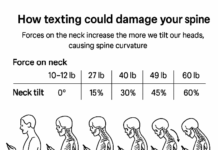Let’s be honest — we’ve all been there. You open your phone just to check one thing, and suddenly it’s 45 minutes later, and you’ve been scrolling through a stream of disasters, drama and depressing headlines.
Sound familiar? That’s doom-scrolling, and it’s become an unhealthy habit for a lot of us. And then there’s that foggy, tired, “my brain feels fried” feeling afterward — yeah, that’s what people are calling brain rot.
Doom-scrolling is when you can’t stop scrolling through bad news or negative content, even though it’s stressing you out. It got especially bad during the pandemic, but even now, it’s super easy to get stuck in that loop, especially with social media and 24/7 news apps constantly fighting for your attention.
What is brain rot? Okay, it’s not an official medical term, but brain rot is that mental burnout you feel after spending too much time online viewing intentionally nonsensical memes. Voted Oxford’s 2024 Word of the Year, the term also refers to the type of content that can contribute to such overstimulation. It can lead to brain fog, feeling unmotivated, losing focus and feeling too drained. It’s like your mind is stuck in low power mode.
According to Benjamin Johnson, University of Florida associate professor, brain rot is also a notably self-deprecating term. “It’s like, ‘This is bad for me, but this is fun. This is a guilty pleasure,” said Johnson.
How do these habits affect us? Studies have found that too much time doom-scrolling can seriously mess with your head. It keeps your brain in a constant state of stress, thanks to a hormone called cortisol. That can lead to anxiety, poor sleep and just an overall blah feeling. Not to mention, most apps are designed to keep you scrolling — the more time you spend on them, the better for them, not for you.
The good news: You’re not stuck in the scroll forever. There are some super doable ways to cut back on screen time and refresh your brain.
Set boundaries with your phone
Use screen time tools on your phone to limit how long you spend on certain apps. Try putting social media apps in a folder far from your home screen or turning off notifications — out of sight, out of mind.
Clean up your feed
If you’re going to be online, make it a better place. Unfollow accounts that drain you. Follow people or pages that make you feel good — think nature photography, cozy book talk or calming nature videos.
Take “no scroll” breaks
Make certain parts of your day phone-free — like the first 30 minutes after you wake up, during meals or before bed. Use that time for something calm and grounding.
Spend some time outside
Fresh air and sunlight are like magic for your brain. Even a short walk can clear your head and boost your mood. Bring a friend, your dog or just some music — whatever gets you out the door.
Do something creative
Instead of picking up your phone when you’re bored, try something creative like reading, doodling or making a new recipe. It’s all about retraining your brain to reach for something restorative, not just something stimulating.
Try a little mindfulness
Apps like Headspace or Insight Timer can help you slow down and become more aware of your habits. Even a couple of deep breaths can reset your brain when you catch yourself getting overwhelmed.
Spend time with actual humans
Yep, real-life people. Meeting a friend for coffee or taking a walk together can make a bigger difference than you think. Human connection is powerful and way more satisfying than another comment section argument.
If doom-scrolling has become part of your daily routine, you’re not alone. But that brain foggy, mentally drained feeling doesn’t have to stick around. With a few small changes — more outside time, fewer phone check-ins and better habits — you can feel more present, more energized and a whole lot happier. You don’t have to quit the internet. You just need to take back control.

























